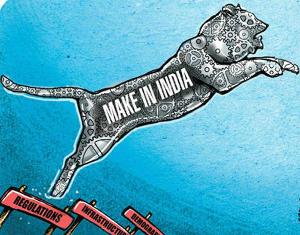
NEW DELHI: The BJP government’s ‘Make in India’ initiative could get top billing in the 2015-16 Union Budget with tax breaks and other measures for several sectors.
Make in India is the centerpiece of the Narendra Modi administration’s bid to revive manufacturing activities and create millions of jobs. With the Chinese economy slowing, India senses an opportunity in the industrial sector.
A blueprint for the 25 identified sectors was presented to PM Modi late last month by the secretaries cutting across departments. The proposals, running into several pages, have been circulated to ministries and the budget is expected to give a final stance on several of the fiscal proposals. The tax proposals are part of the one-year roadmap identified by ministries.
While some of the moves will boost domestic production and reduce imports, they will also make purchases lighter on your pocket. For instance, there is a recommendation to halve the excise duty on footwear to 6%. Similarly, the commerce department has suggested a reduction in the customs duty on gold and silver from 10% to 2%, a proposal which will have to be weighed in the context of the overall import bill and its impact on the exchange rate.
The food processing ministry has suggested that brand building should be treated the same way as R&D and 200% of expenditure be allowed as deduction. It also wants sops on primary processing of perishables to cut down wastages, which will help check price swings.
For defence, where the government is seeking to reduce the dependence on imports, the ministry wants a tax holiday for local manufacturing and further sops for R&D.
The department of information technology has also suggested income tax benefits to attract electronics and telecom equipment manufacturers into the country and reform the inverted duty structure where the customs tariff on finished goods is lower than those on components. In the run up to the elections, Modi had suggested that local electronics manufacturing will not just create jobs but also help narrow the current account deficit.
Again to cut down on foreign exchange outgo, the civil aviation ministry has suggested incentivizing maintenance, repair and operations (MROs) be exempted from service tax, while also proposing that airline operators be allowed to issue tax-free infrastructure bonds to help raise funds.
Similarly, the shipping ministry wants a specialized financing window for ship-building and repair, besides easier tax rules for the sector. Railways too want “time-bound” tax sops through excise holiday, although it has not spelt out the details.
For micro, small and medium enterprises (MSME), which are seen as the mainstay of the Make in India initiative, the ministry has proposed that there should be direct tax exemptions during the first three year of operations, a move that may be tough to implement.
In case of the petrochemicals sector there is a proposal to boost local manufacturing by having higher import duty on finished products and low rates on feedstock. For metals and cement it has been suggested that the customs duty on steel products be increased, while allowing duty-free import of raw materials and ore – moves that will discourage imports.
There are also demands for budgetary allocation for sectors such as biotechnology, where an allocation of Rs 1,000 crore has been sought for bio-manufacturing and another Rs 750 crore for scaling up Indian biotech start-ups and SMEs. For mining an annual budgetary support of Rs 500 crore has been sought to encourage exploration. The tourism ministry has demanded an annual budget of Rs 3,000 crore, compared to a little under Rs 2,000 currently.
The petroleum ministry has demanded targeted fiscal measures through interest subvention and long-term funding for manufacturing clusters from the Oil Industry Development Cess.
Source: ETTelecom


 Comment
Comment By Konnect Worldwide
By Konnect Worldwide